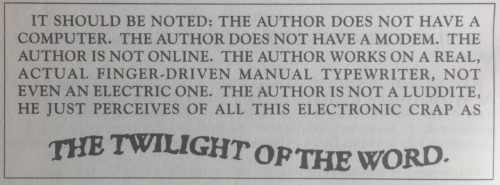Side by side this evening, Samara reads Samuel Pepys while I read Ongoingness: The End of a Diary by Sarah Manguso.
Manguso:
To write a diary is to make a series of choices about what to omit, what to forget. A memorable sandwich, an unmemorable flight of stairs. A memorable bit of conversation surrounded by chatter that no one records.
Pepys, meanwhile, has noticed that wigs are in vogue and he instructs a barber to shave his head so that he can then (get this) go around London wearing a wig made from his own hair. Pepys tells his diary how delighted he is that nobody can tell, so authentic is his wig. I’m not sure why covert wig-wearing is his response to fashionable, conspicuous wig-wearing.
When my wife points out that she’s reading a diary at the very same time that I’m reading a book about a diary, we pause so I can write my diary for yesterday to complete the cycle: writing, reading, analysing. When I post, Samara checks to see how it looks on her phone. “It’s real!” she says.
I think the current diary mania in our house began when Peter asked a few months ago why I like diaries so much. I hadn’t noticed (but he had) that I read a lot of diaries. Since I hadn’t noticed, I couldn’t answer but I have been thinking about it since. This evening, Manguso’s book comes close to hitting on an answer I can identify with:
I often prefer writers’ diaries to their work written intentionally for publication. It’s as if I want the information without the obstacles of style or form. But of course all writing possesses style and form, and in good writing they aren’t obstacles.
Another friend said, I want to write sentences that seem as if no one wrote them. The goal being the creation of a pure delivery system, without the distraction of a style. The goal being a form no one notices, the creation of what seems like pure feeling, not of what seems like a vehicle for a feeling. Language as pure experience, pure memory. I too wanted to achieve that impossible effect.

